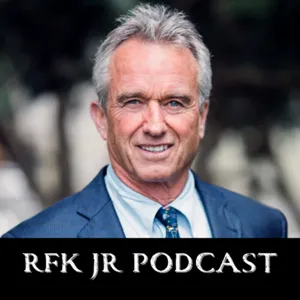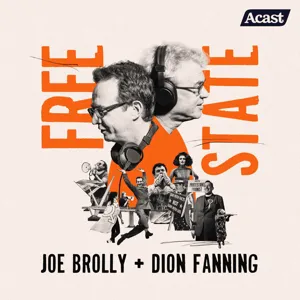Podcast Summary
A private law firm dominates the US justice system against a human rights lawyer: A private law firm, with financial ties to the oil industry, is prosecuting a human rights lawyer criminally, illustrating the corporate takeover of American democracy and its harmful effects on people and the environment.
The justice system and democracy in the United States can be dominated by corporate power, as shown in the extraordinary case of human rights lawyer Steven Donziger. He has been under house arrest, disbarred, and faces criminal charges from a law firm representing Chevron, who are angry about a lawsuit win. This is a dystopian nightmare where a private law firm, with financial ties to the oil industry, is appointed to prosecute Steven criminally. This goes back to the late 1980s when Texaco, now Chevron, operated in Ecuador's Amazon region with disregard for the environment and indigenous communities. They dumped toxic waste into production pools and rivers, causing health issues and deaths among the locals. Despite their complaints, Texaco continued, knowing they were unchecked. The story illustrates the dangerous corporate takeover of American democracy and the devastating consequences for people and the environment.
Texaco's deliberate pollution in Ecuador harmed local communities: Texaco intentionally polluted Ecuadorian land and water, causing harm to indigenous communities. Despite evidence, they denied responsibility and evaded payment in a US lawsuit.
The Texaco oil company intentionally polluted the land and water sources in Ecuador, causing harm to local indigenous communities. Despite the evidence, Texaco denied the harm and even lied to the affected communities. When a lawsuit was brought against them in the United States, they tried to avoid it and instead found a sympathetic judge in New York who helped them evade payment. The pollution, which was deliberate and systematic, was much more damaging than the Exxon Valdez oil spill, as it occurred in a sensitive environment where people relied on the land and water for their sustenance. The affected communities were poisoned little by little, and the pollution has never been cleaned up. This case highlights the importance of holding corporations accountable for their actions and the need for fair and impartial judges in legal proceedings.
Chevron vs. Donziger: The Battle Over Amazon Rainforest Damages: Despite facing intense corporate retaliation, lawyers representing Ecuadorian villagers secured a validated judgment against Chevron for Amazon rainforest damages. Corporations may go to great lengths to avoid payments, but upholding due process and the rule of law is crucial.
The legal battle between Chevron and the lawyers representing the people of Ecuador over environmental damages in the Amazon rainforest has been marked by unprecedented corporate retaliation. The lawyers, led by Steven Donziger, have faced a campaign of vicious attacks, including house arrest, allegations of fraud, and the involvement of over 2,000 lawyers from 60 law firms. Despite these challenges, the judgment against Chevron, which has been validated by multiple appellate courts in Ecuador and Canada, remains. Chevron's attempts to discredit Donziger and his team, including the use of a paid witness who later recanted his testimony, have been met with skepticism and rejection by the courts. The case highlights the lengths corporations may go to avoid paying judgments and the importance of upholding due process and the rule of law.
American lawyer claims unfair treatment in Chevron dispute: Lawyer Steven Donziger alleges Judge Lewis A. Kaplan's ruling against him in a lawsuit against Chevron was influenced by Chevron's payments to a witness and refusal to consider evidence from the Ecuadorian trial, leading to his contempt of court charges and asset freezes.
Steven Donziger, an American lawyer, claims that he was unfairly treated by Judge Lewis A. Kaplan in a long-running dispute with Chevron. Donziger was representing Ecuadorian communities in a lawsuit against Chevron for environmental damages, but Kaplan ruled against him and ordered him to pay $1.07 billion in damages and legal fees. Donziger believes this outcome was influenced by Chevron's payments to a witness, which Kaplan allowed, and which Donziger considers a bribe. Donziger also alleges that Kaplan refused to consider the evidence presented in the Ecuadorian trial. As a result, Donziger's bank accounts were frozen, and he was placed under house arrest for contempt of court. Donziger maintains that the Ecuadorian communities have won their case, and that the unfavorable outcome against him is due to his success in pursuing Chevron's assets in other countries.
Using the legal system as a weapon against lawyers: The legal system can be misused to intimidate and silence lawyers, particularly those handling human rights and environmental justice cases. Attorney-client privilege must be protected to maintain the integrity of the legal system.
The legal system can be used as a weapon to intimidate and silence individuals, particularly lawyers, who are involved in high-stakes disputes, especially those related to human rights and environmental justice. In this case, a lawyer had his bank accounts frozen, was accused of hiding money, and had his electronic devices seized, all of which violated attorney-client privilege. The lawyer requested to be held in civil contempt to appeal the order, but instead, was charged with criminal contempt and spent over 590 days in home confinement – the longest sentence for a lawyer in New York convicted of criminal contempt. The unusual criminal contempt charge came from the judge, not the prosecutorial office, which is against the separation of powers in the American system. This case highlights the importance of upholding the ethical obligations of lawyers and the need to protect the attorney-client privilege to ensure the functioning of the legal system.
A lawyer representing Ecuadorian communities against Chevron faces unprecedented private prosecution by a law firm with industry ties: A lawyer representing Ecuadorian communities against Chevron is being privately prosecuted by a law firm with ties to the oil and gas industry, raising ethical concerns. He's asking the DOJ to take over the case for a fair trial, and people can support him through his campaign and defense fund.
Steven Donziger, a lawyer who represented communities affected by Chevron's oil operations in Ecuador, was prosecuted by a private law firm, Seward and Kissel, appointed by a judge in an unprecedented move. The firm's extensive ties to the oil and gas industry, including Chevron, raise serious ethical concerns. Donziger was denied a jury trial and has been locked up since then. He is now asking the Department of Justice to take the case away from Seward and Kissel and prosecute him directly to ensure a fair trial. People who want to help can sign up for his campaign and donate to his defense fund on the website free donziger.org. The case has garnered support from various human rights groups and Nobel Prize winners.
The Legal Case of Steven Donziger: Targeted for Challenging Chevron: Human rights lawyer Steven Donziger faces unprecedented legal challenges, including being sued under civil RICO without a jury, disbarred without a hearing, and held pretrial at home, raising concerns about the potential capture of the judiciary by Chevron and risks for those challenging the fossil fuel industry.
The legal case of Steven Donziger raises serious concerns about the potential capture of the judiciary by a powerful corporation like Chevron. Donziger, a human rights lawyer, has faced unprecedented legal challenges, including being the first person to be sued under civil RICO without a jury, the first person disbarred without a hearing based on a civil fraud charge without a jury, and the first person held pretrial at home for an extended period. These irregularities have led Donziger to argue that he's being targeted because of his successful multibillion-dollar lawsuit against Chevron, which challenges the company's business model and approach to pollution. The case goes beyond Donziger himself and highlights the potential risks for human rights lawyers, law students, and NGOs who challenge the fossil fuel industry. Donziger's situation raises questions about the rule of law and the role of the judiciary in protecting the rights of individuals and communities against powerful corporations.
Manipulating the Legal System to Silence Dissent: The powerful can manipulate the legal system to silence dissent and undermine due process, as seen in the case of a lawyer who faced retaliation for challenging Chevron, resulting in a biased judicial process and a violation of fair hearing principles.
The legal system can be manipulated by the powerful to silence dissent and undermine due process. The speaker, a lawyer who won a landmark case against Chevron but faced retaliation, shares how he was suspended from practicing law based on questionable findings from a biased judge. Despite evidence in his favor, higher courts overturned decisions that would have reinstated his license. This abuse of power, as the speaker sees it, is a form of crony capitalism and feudalism for the rest of us. The legal process was supposed to provide a fair hearing, but in this case, it was influenced by the very industry he had challenged. The speaker's ongoing appeal to the New York Court of Appeals highlights the importance of upholding due process and questioning the power dynamics within the legal system.
Judge Kaplan's biased treatment towards corporations: Judge Kaplan's past corporate representation and biased decisions towards human rights cases warrant transparency and fairness in judicial appointments and decision-making processes.
There is a significant disparity in the treatment of individuals who fight for human rights versus those who represent corporate interests in the legal system, specifically in the bar grievance process in New York. This was discussed in relation to Judge Lewis Kaplan, who has been criticized for his sympathetic stance towards corporations. Despite his past representation of corporate interests and questionable decisions, there is limited information available about why he holds this ideology. The speaker emphasized that they have always respected Judge Kaplan personally, but believe his decisions, particularly in cases involving human rights lawyering, are not proper. An example of this was the Ecuador case, where Judge Kaplan ruled against the Ecuadorian judicial system based on paid Chevron witness testimony, despite previously praising it. This case highlights the need for greater transparency and fairness in the appointment and decision-making processes of judges.
The Chevron vs Donziger case raises questions about corporate influence in US justice system: The Chevron vs Donziger case, where a US judge overruled foreign courts, highlights potential unequal treatment and raises concerns about corporate influence in the US justice system.
The legal battle between Chevron and Steven Donziger, which began in Ecuador and was later moved to the United States, raises serious questions about the impartiality and credibility of the judicial system when it comes to powerful corporations and their influence. The case saw Chevron successfully challenging a $9.5 billion judgment in Ecuador in the US, despite the original verdict being upheld by both Ecuadorian and Canadian appellate courts. Critics argue that US District Judge Lewis A. Kaplan's ruling, which overturned the Ecuadorian judgment, was an unprecedented attempt by a single US judge to overrule foreign courts. This situation highlights the potential for unequal treatment and raises concerns about the role of corporate influence in the US justice system. To learn more about the case and support Steven Donziger, visit freedonziger.org.
A lawyer's fight against 'petroleum tyrants' goes to trial: Lawyer Steven Freedman, fighting for the rights of the poorest communities against 'petroleum tyrants', is asking for public support through donations, updates, and bearing witness to his trial on May 10th, 2023, which will be broadcasted on Zoom and potentially live-streamed on The Defender's platform.
Steven Freedman, a human rights and environmental lawyer, is currently facing a trial on May 10th, 2023, and is asking for public support through donations, signing up for campaign updates, and bearing witness to the trial in person or via Zoom due to COVID-19 restrictions. Freedman's case revolves around fighting against "petroleum tyrants" for the rights of the poorest communities. He encourages following him on Twitter (@sDanziger) and Instagram for daily updates on the case. The trial will be broadcasted on Zoom, and they are exploring the possibility of live streaming it on The Defender's platform. Freedman's work has been an inspiration for human rights and environmental lawyers for years.






